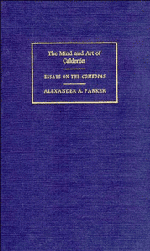Book contents
- Frontmatter
- Contents
- Author's preface
- Editor's preface
- Introduction
- I Stylistic and dramatic craftsmanship
- II From experience to myth
- 6 The father–son conflict
- 7 Segismundo's tower: a Calderonian myth
- 8 Horoscopes and their fulfilment
- 9 Fate and human responsibility (1): the problem
- 10 Fate and human responsibility (2): a dramatic presentation – El mayor monstruo los celos
- III The tensions of social life
- IV The tensions of public life
- V From symbol to myth
- Epilogue
- Notes
- Index
6 - The father–son conflict
Published online by Cambridge University Press: 05 February 2012
- Frontmatter
- Contents
- Author's preface
- Editor's preface
- Introduction
- I Stylistic and dramatic craftsmanship
- II From experience to myth
- 6 The father–son conflict
- 7 Segismundo's tower: a Calderonian myth
- 8 Horoscopes and their fulfilment
- 9 Fate and human responsibility (1): the problem
- 10 Fate and human responsibility (2): a dramatic presentation – El mayor monstruo los celos
- III The tensions of social life
- IV The tensions of public life
- V From symbol to myth
- Epilogue
- Notes
- Index
Summary
In a dramatist who by any ordinary standards wrote so much (though not by the phenomenal standards of Lope de Vega or even of Tirso de Molina) it is not easy to speak of sources of inspiration. The ultimate source of inspiration must, however, be his own experience of life, transmuted into dramatic poetry. In the case of Calderón we can detect a group of plays that can be plausibly connected with his early life on the basis of documentary evidence, and these contain plots for which he draws on his direct experience. These form the first division of his output. The second division is formed by plays that most reflect his involvement in his society, but still more reflect or are directed towards his audience's involvement in their common society. A further heading would cover religious themes. Although Calderón has some striking religious comedias, his attempt to find dramatic form for the problems of faith and religious experience lies mainly in the corpus of his autos sacramentales; though these derive from the medieval drama, they are so far advanced in conception and execution that they really form a whole dramatic genre in themselves, which is excluded from this book. Calderón's religious comedias, as befits the secular stage, bring religion into closer contact with the life of society. They deal more with the impact of religious faith on public life, such as crusading wars, and various problems covered by religion and politics, which include the question of conformity or non-conformity to religious beliefs imposed by political means.
- Type
- Chapter
- Information
- The Mind and Art of CalderónEssays on the Comedias, pp. 69 - 85Publisher: Cambridge University PressPrint publication year: 1989



